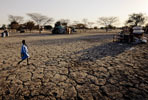
As my colleague Matt Brown pointed out last week, Southern Kordofan Governor Ahmed Haroun has been an interesting character to watch in the recent talks to quell violence in the contested Abyei region. Did this man, wanted by the International Criminal Court for allegedly orchestrating war crimes in Darfur, have a change of heart? Maybe not.
A week out from the meeting in Kadugli, the situation in Abyei has stabilized, but sources on the ground say the environment is tense. The agreement seems to have subdued things, but few people Enough spoke to anticipate that the relative calm will last long. Time will tell, but it is hard to be optimistic that the recent apparent goodwill on the part of the negotiating parties is as forthright as it seems. The range of agendas found within the Misseriya and Dinka communities themselves further complicates implementation of the agreement.
In addition to the four points Matt outlined, the representatives at the Kadugli talks also agreed that returnees would be protected by the Sudanese Armed Forces, or SAF, while in the North and by a Joint Integrated Unit while passing through Abyei. A technical team of senior police officers would look into the policing problem in Abyei and come up with solutions.
The problem is that even though UNMIS has been tasked with monitoring implementation of this agreement, U.N. officials, speaking in confidence, say they don’t know what to monitor because the agreement is mostly overarching, with few specifics about who is responsible for what. In particular, it is unclear who is going to make the first move when it comes to disarmament – which everyone seems to acknowledge is the key to any lasting security in the area.
Some of the Misseriya elders have blamed rebellious Misseriya youth gangs in northern Abyei for the precarious security situation. The day the Kadugli agreement was signed, another firefight broke out when armed Misseriya attacked a SAF-protected convoy of returnees. Despite SAF’s role as an escort, the soldiers did not return fire. In the days since the agreement was signed, the movement of returnees hasn’t been smooth. UNOCHA reported that organized returns through Southern Kordofan have been suspended since January 9 due to these security incidents, but smaller convoys of “spontaneous” returnees continue to travel south.
Officials in Unity state, which borders the Abyei region and has similar tensions with the Misseriya over grazing and arms, explain that the SAF did not fire back because the northern army and the National Congress Party, especially Haroun, do not want to alienate the Misseriya at this juncture. The SAF and the NCP are worried about the Misseriya youth gangs – and here Unity state officials are speaking from firsthand experience – who have been very dissatisfied with both the NCP and SPLM for the way the Abyei negotiations have been handled thus far. In particular, these Misseriya gangs want land in Abyei and have threatened to join JEM and other rebel groups if the NCP continues negotiating without these interests in mind.
Tensions over Abyei also have the potential to inflame neighboring trouble spots. Hardline NCP and some Misseriya leaders feel Haroun is becoming soft and are wary of his good rapport with Deputy Governor of Southern Kordofan Abdul Aziz, an SPLM member. Southern Kordofan is slated to hold elections, postponed from last year, this coming April. However, tensions have again arisen over the census, which also prompted the earlier delay. A local journalist and a youth SPLM leader in Kadugli told Enough of protests last week over what demonstrators view as inadequate representation of some communities. The SPLM is again complaining that its constituency is not accurately represented. The NCP-SPLM collaboration in Southern Kordofan will be over quickly if this perception of disenfranchisement is not handled well.
Electing a state assembly in Southern Kordofan is the first step toward holding popular consultations, a process mandated by the Comprehensive Peace Agreement to address grievances of the people of Southern Kordofan toward the Khartoum government. Ongoing delays of that process have the potential to destabilize the area if people begin to question whether their voices will be heard.
Finally, another neighboring hotspot: Unity state to the south. Apart from its familiarity with some of the tensions plaguing Abyei, Unity state could quickly be drawn into the challenges in Abyei because as returnees from the North – tens of thousands more are predicted to still be on their way – are forced to find a detour around Abyei, they will likely pass through Unity.
An announcement by renegade general Gatluak Gai in Unity threatens to complicate establishing alternative routes for returnees. Gai, who was offered a presidential pardon to put down his arms last year, announced last week on a Bentiu radio station that he is dissatisfied with the way southern Vice President Riek Machar handled peace negotiations with him. He said that he wants a direct meeting with the president and Governor Taban, and until then, he will refuse any offers of amnesty.
If returnees were re-routed through Unity state, they would have to travel through Abiemnom and Mayom counties, areas controlled by Gai and his men. While many southerners have already returned to Unity, Gai’s announcement was a sobering reminder of the potential peril that may await returnee convoys re-routed from Abyei. Threatening the convoys would shift the spotlight from Abyei to Unity – in a bad way for Unity officials (not to mention for the returnees, of course) but perhaps in a “good” way for Gatluak Gai, whose negotiating position improves the more influential he appears. Add to the mix the fact that the commissioners of Abiemnon and Mayom counties have not yet finalized grazing agreements with Misseriya.
Clearly, there are many variables to watch in a volatile stretch of Sudan’s North-South border.
Photo: A boy crosses cracked earth in a settlement of returnees in Abyei (Enough/Tim Freccia)

